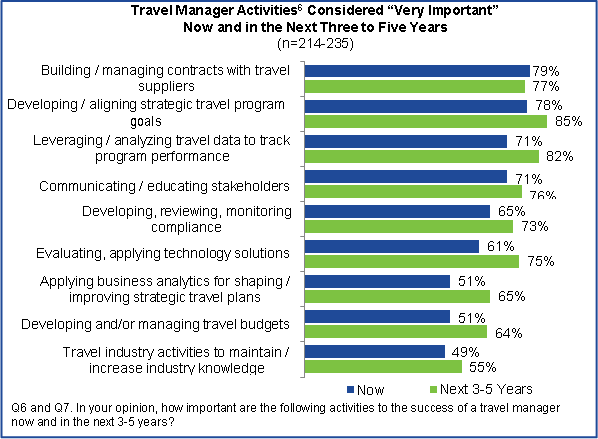 Travel Management is an evolving process which shares characteristics with and is influenced by procurement and finance, but retains its own unique challenges and characteristics. Procurement generalists have a tendency to view travel as commodity purchases, which may be valid, but can result in glossing over the industry-specific nuances, like shifts in the travel value chain, and therefore may be less effective. Meanwhile, those with a finance perspective see expense control as the best way to improve company performance in general, making travel a category they want to control and manage closely. They may be more likely to focus on compliance with travel policy and in many organizations the finance department has direct input to the creation of travel policies. By incorporating and balancing both of these perspectives, a more effective and satisfactory travel program can be created.
Travel Management is an evolving process which shares characteristics with and is influenced by procurement and finance, but retains its own unique challenges and characteristics. Procurement generalists have a tendency to view travel as commodity purchases, which may be valid, but can result in glossing over the industry-specific nuances, like shifts in the travel value chain, and therefore may be less effective. Meanwhile, those with a finance perspective see expense control as the best way to improve company performance in general, making travel a category they want to control and manage closely. They may be more likely to focus on compliance with travel policy and in many organizations the finance department has direct input to the creation of travel policies. By incorporating and balancing both of these perspectives, a more effective and satisfactory travel program can be created.
The Travel Manager role involves a wide range of responsibilities and abilities. For example, they may have responsibilities with developing travel program policies, managing contracts with suppliers, and monitoring travel budgets. Successful Travel Managers tend to have a high level of familiarity and experience with travel concepts, practices, and procedures, and ability to maximize savings and minimize costs in order to operate within company budget. This is done in part by building relationships and negotiating with vendors to get the best possible rates for travel. It also necessitates excellent communication and networking skills with all internal stakeholders, as well as embracing the role of facilitator and contact for external organizations.
Technology is a large driver of change both in general and in travel specifically, so Travel Managers tend to continually look for new technological solutions to accommodate their travelers, such as mobile technology, as well as solutions to support the travel program, such as travel data analysis or expense management. These solutions are also useful in tracking key metrics, which can serve as concrete evidence of the value of the Travel Managers’ role to show company executives who may not otherwise understand the importance of the travel program. It is also important for Travel Managers to track their program’s performance and leverage data so that they can make informed, strategic decisions with their program’s resources. This involves identifying the key data to measure so that Travel Managers can recognize when the travel program is being managed successfully and when adjustments need to be made.
ROLE OF THE TRAVEL MANAGER
Activity Prioritization
Travel Managers have a wide range of responsibilities and in order to use their time most efficiently, it is beneficial for them to have a sense of which responsibilities are important, and ideally be able to focus their time on the activities they deem most important. This study found that most Travel Managers consider all their activities to be valuable to the current success of a Travel Manager with at least three quarters saying each activity is “important” or “very important.” Although they perceive all of the activities as highly important, the following analysis focuses on the “very important” ratings as a more meaningful measure of the top-ranking activities. Another general trend was for Travel Managers with more experience in the corporate travel industry (20 or more years), as well as Travel Managers from companies with high travel spend ($30 million or more), to rate the listed activities as more important than their counterparts. Concerning the future importance of the same activities in the next 3-5 years, Travel Managers expect all activities’ importance level to either remain the same or increase in the next 3-5 years.

KEY TAKEAWAYS
- Broadly, Travel Managers can expect to see their role becoming more strategic in nature in the near For example, activities such as leveraging travel data, and developing and aligning strategic travel program goals will become significantly more important to the Travel Managers’ future success than current success. Meanwhile, building and maintaining contracts and relations with travel suppliers, a decidedly tactical activity, is the one activity that is expected to remain the same over time. This supports the idea of increasing strategy for Travel Managers in the next three to five years, and provides a good direction for Travel Managers to focus their attention in order to remain at the forefront of changes in the industry.
- It is also evident that technology’s importance to Travel Management will be rapidly increasing, as seen by the significant increase in number of people expecting it to be important in the near future compared to Technological advances in their field is an important area for Travel Managers to devote more time to expanding their knowledge, given it is an area expected to take up more time in the future and it is an area that is difficult to keep abreast of. Particularly as younger generations of traveling employees join the workforce, technology is likely to take on a larger role in all aspects of travel management.
- Mobile technology is predicted to be a much higher priority in the near future than it is now. More travelers will want this option, particularly for online booking and itinerary planning, as well as providing a means of tracking travelers’ Another technological solution mentioned is payment technology, such as mobile payments. This field of technology is likely to see an increase in developments in the near future, and Travel Managers would benefit to monitor new mobile solutions closely and consider if they are the right solution for their travel program.
- The general consensus about the most important metrics to track and the most valued KPIs according to senior leadership are all in some way related to costs and Whether it is about travel spend, policy compliance, or tracking negotiated rates, all of these measurements relate back to the bottom line. These are among the most important data that Travel Managers should be tracking in order to show their company’s executives the performance and value of their managed travel program.
- In general, Travel Managers face the most challenges working with multiple sources and formats of data, in addition to spending too much time manually reconciling data due to Furthermore, they are less than satisfied with the travel tools and reporting capabilities available to them. Taken together, these results indicate a clear need for data consolidation and better methods and tools for data collection and reporting, which could be areas of opportunity for technology developers and suppliers.
Full study report from GBTA Foundation

